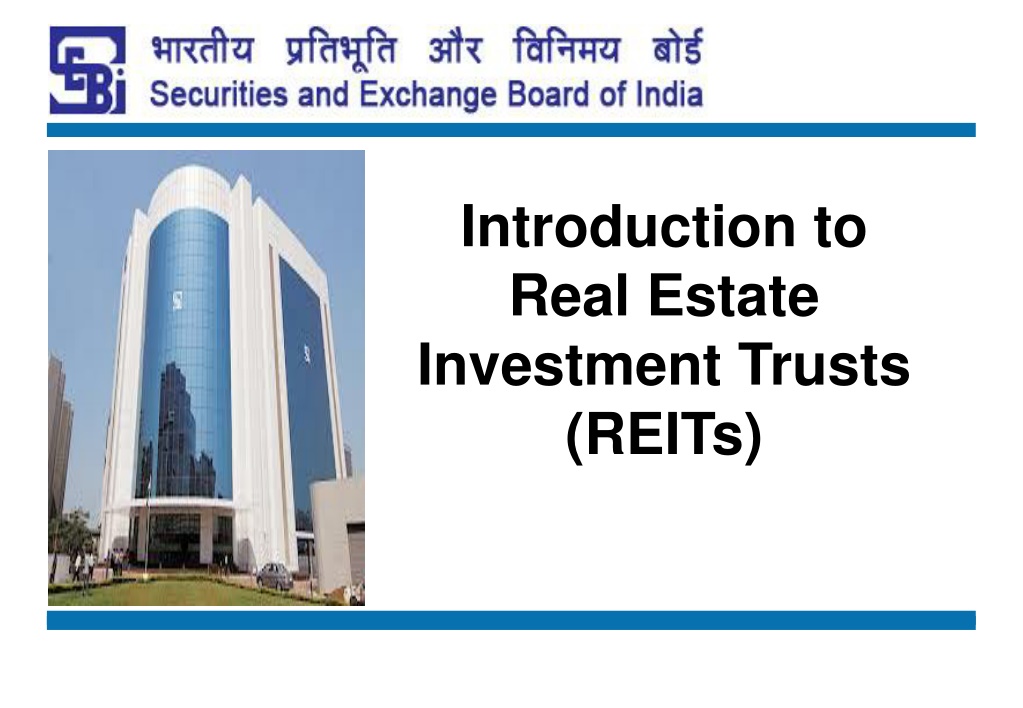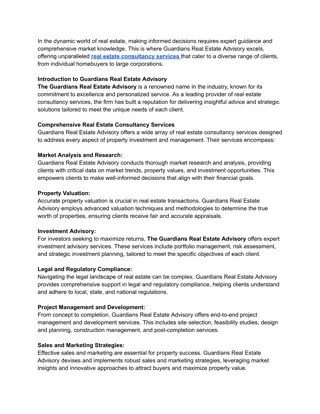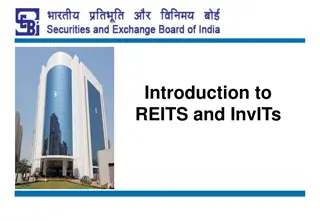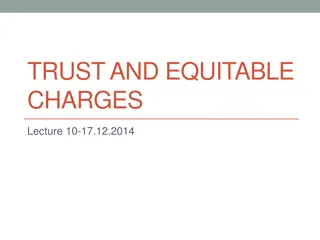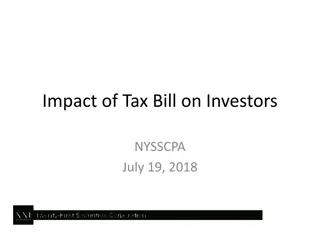An Introduction to Real Estate Investment Trusts (REITs)
Real Estate Investment Trusts (REITs) function like mutual funds by pooling money from multiple investors to invest in income-generating real estate assets. This presentation covers the overview, structure, constituents, cash flow, benefits, taxation, and considerations for investing in REITs. It explains how REITs are managed, traded on stock exchanges, and provide small-ticket access to real estate ownership. Additionally, it outlines the roles of sponsors, trustees, managers, and investors in the REIT framework.
Download Presentation

Please find below an Image/Link to download the presentation.
The content on the website is provided AS IS for your information and personal use only. It may not be sold, licensed, or shared on other websites without obtaining consent from the author.If you encounter any issues during the download, it is possible that the publisher has removed the file from their server.
You are allowed to download the files provided on this website for personal or commercial use, subject to the condition that they are used lawfully. All files are the property of their respective owners.
The content on the website is provided AS IS for your information and personal use only. It may not be sold, licensed, or shared on other websites without obtaining consent from the author.
E N D
Presentation Transcript
Introduction to Real Estate Investment Trusts (REITs)
Disclaimer Disclaimer Information contained in this presentation is as on December 10, 2021. The information contained in this presentation is only for Educational and Awareness Purposes related to securities market. This presentation is only for Educational and Investor Awareness Programs and shall not be used for any legal interpretations. SEBI or Stock Exchanges or Depositories shall not be responsible for any damage or loss to any one of any manner from use of this material. Suggestions or feedbacks, if any, may please be sent by mail to visitsebi@sebi.gov.in. 2
Flow of Presentation Flow of Presentation 1. What are REITs? - Overview; 2. Structure of REITs; 3. Role of Constituents of REITs; 4. Cash flow in REITs; 5. Benefits of investing in REITs; 6. Who can invest in REITs; 7. How to own units of REITs; 8. Rights of unitholders in REITs; 9. Taxation aspects of REITs; 10. Points to ponder before investing in REITs. 3
What are REITs - Overview REITs stands for Real Estate Investment Trusts . REITs are like Mutual Funds. REITs allow pooling of money from multiple investors into a single trust Trust which is professionally managed by a manager Manager invests in immovable and rent yielding properties or special purpose vehicles (SPVs) holding such kind of properties. REITs own, operate and manage a portfolio of income generating real estate assets. REITs give investors access to the benefits of owning real estate assets in small ticket sizes. Listing of REIT is mandatory. Thus, they are traded on the stock exchanges and investors can buy and sell REIT units just like trading of shares of any listed company. 4
Structure of REIT Sponsor / Investor Ownership of units Distribution of cash flows Holds the REIT assets in trust for the benefit of the Unit holders Management Services Manager Trustee REIT Manager Fee Distribution of Cash Flows Holding Company Distribution of Cash Flows SPV * SPV * * REITs to hold assets either through Special Purpose Vehicles (SPVs) or directly 5
Role of Constituents of REITs Sets up the REIT Transfers its shareholdings in SPV / assets to the REIT Appoints the Trustee Sponsor Holding the REIT assets in trust for the benefit of the unit holders Responsible for ensuring that the business activities and investment policies comply with the provisions of the regulations Trustee Sets the strategic direction of the REIT and decides on the acquisition, divestment or enhancement of assets Responsible for all activities related to issue and listing of units Takes decisions on distribution to unitholders Makes disclosures to various regulations Ensures redressal of investor grievances Investment Manager stakeholders as per 6
What Assets Can a REIT Own? NOT Commercial Sectors Rental income PERMITTED Earning Real Estate Projects Agricultural Land Speculative landbank Offices, Hotels, Retail, Industrial, Healthcare Leverage Restrictions Min. 80% Max. 20% Unitholder approval needed for Debt to Capitalization above 25% completed & income producing assets under-construction assets Debt to Capitalization capped at 49% 7
Cash flow in REITs : An illustration Unitholders Distributed to Unitholders For tax treatment in the hands of Unitholders, distributions are divided into Dividend Interest Return of Capital Unitholders make investment into REIT by subscribing to its units REIT Distribution in the form of : Dividend Interest Return of Capital REIT invests into SPVs in the form of Equity SPV* 1 SPV* 2 SPV* 3 * REITs to hold assets either through Special Purpose Vehicles (SPVs) or directly 8
REITs A Hybrid Product between Equity and Fixed Income Fixed Income Equity REITs Regular and growing cash yield Appreciation through increasing property valuation Yield Oriented Capital Appreciation Oriented REITs generate income in two ways, viz. (i) Regular income through Dividend / Interests, (ii) Income through Capital gains 9
Benefits of Investing in REITs? Liquidity Transparency Asset Quality REIT units are freely traded in stock markets like equity shares Strong governance framework and disclosure requirements from SEBI Fractional ownership commercial assets Distributions Performance Diversification Income stability due to requirement to distribute at least 90% of cash flows semi-annually Upside participation in capital appreciation from organic / inorganic growth Investment in a diversified portfolio across sectors / cities 10
Taxation aspects in REITs Nature of Distribution Tax Treatment in the hands of Investor # Interest income Taxable Dividends Exempted (If the SPV has not opted for the lower tax regime) Taxable (If the SPV has opted for the lower tax regime) Rental income Taxable # Investors need to check which type of income they receive and applicable tax treatment. 11
Comparative Analysis Vis- -vis traditional investments Direct Investment inReal Estate RealEstate EquityShares REIT Units 25 lakh onwards (for strata units) Illiquid & non- transparent market Hassles in managing assets Transaction costs involved Minimum lot size of 1 unit Freely transferable listed securities Professionally managed No entry / exit load Minimum lot size of 1 share Freely transferable listed securities No entry / exit load Investment Characteristics Returns driven by capital appreciation and regular cash distribution (90% mandatory) Returns driven by capital appreciation and dividends (NOT mandatory) Returns driven by a timely and profitable exit Return Profile Dividends: Exempted# Interest : Taxable # Rent : Taxable # Tax Efficiency Rent is taxable Dividends are taxable 12 Notes: # Investors need to check which type of income they receive and applicable tax treatment.
Who can Invest in REITs? Any investor (domestic / foreign / retail / institutional) can buy REIT units in India; The minimum subscription amount is in the range of 10,000 to 15,000/- and the trading lot is 1 unit. (revised w.e.f. July 30, 2021) Previously it was 50,000 & 100 units, respectively; Investors can purchase REIT units through a Demat account, similar to how they would purchase equity shares; REITs are suitable for those who wants to take price benefits / returns from Real Estate. 13
How to own units of REITs Investors can own units of REITs in following manner: By subscribing to issue in Initial Public Issue (IPO) or Follow- on Issue of a REITs, By purchasing units of REITs from Stock Exchange, where they are listed, Procedures for the bidding, application, payment, and Allotment of REITs Units in Public Issue (IPO or Follow-on Issue) Price of Units shall be determined through Book building process, Investors are required to participate in the Issue only through the ASBA process. 14
How to own units of REITs (contd.) Investors are required to pay the full Bid Amount or instruct the bank to block the full Bid Amount at the time of Bidding, Investors should note that Allotment to successful Bidders will be only in the dematerialized form, Mention correctly the details of the Bidders depository accounts including DP ID, PAN, Client ID and Bid cum Application Forms, Units of REITs are listed on a stock exchange within 12 working days from the close of issue. 15
Rights of unitholders in REITs Right to receive returns through cash distributions made by the trust, Right to vote on matters pertaining to acquisition of new assets or borrowing, Right to vote on related party matters, Right to vote on matters such as appointment or change of the Investment Manager, Right to vote on induction of a Sponsor, with the opportunity to exit for dissenting voters, Right to vote on exit of Sponsor, Right to receive periodic disclosures like annual report, valuation report, quarterly/ semi-annual financials, etc. 16
Disclosures to Unit-holders by the REIT Investors are advised to regularly refer to the disclosures / communications sent by the REIT and stay aware about their investments Half-yearly Report Earnings Materials Earnings Call Held quarterly by management Published semi-annually Published quarterly and benchmarked to global disclosure standards (NOT Required by Listed Companies) Unitholder Meetings & Webinars Independent REIT Valuation Annual Meeting Held once a year Conducted half-yearly Held throughout the Year 17
Regulations to protect the interests of REITs unitholders Securities Exchange Board of India (SEBI) SEBI (REITs) Regulations, 2014 SEBI (Listing Obligations and Disclosure Requirements) Regulations, 2015 SEBI (Prohibition of Insider Trading) Regulations, 2015 Reserve Bank of India Foreign Exchange Management (Non-debt Instruments Rules), 2019 Indian Trusts Act, 1882 Others Companies Act, 2013 Competition Act, 2002 18
Points to Ponder while investing in REITs Stability of income of Trust depends stability of income earned from the assets of Trust, Invest in REITs which offer better transparency, Investment in REITs is to generate regular income and also to earn capital gains, Due diligence to be made before taking investment decisions. 19
20 Additional Information For Further Information, you may visit following websites: www.sebi.gov.in/ https://investor.sebi.gov.in/ For Grievance Redressal, you may visit following website: www.scores.gov.in/ Or, you may call SEBI at following Toll-free Helpline Numbers from 9:00am to 6:00pm on all days (excluding declared holidays in the state of Maharashtra): 1800 266 7575 1800 22 7575 Helpline is Available in 8 Languages: English, Hindi, Bengali, Gujarati, Marathi, Kannada, Telugu and Tamil 20
THANK YOU 21
